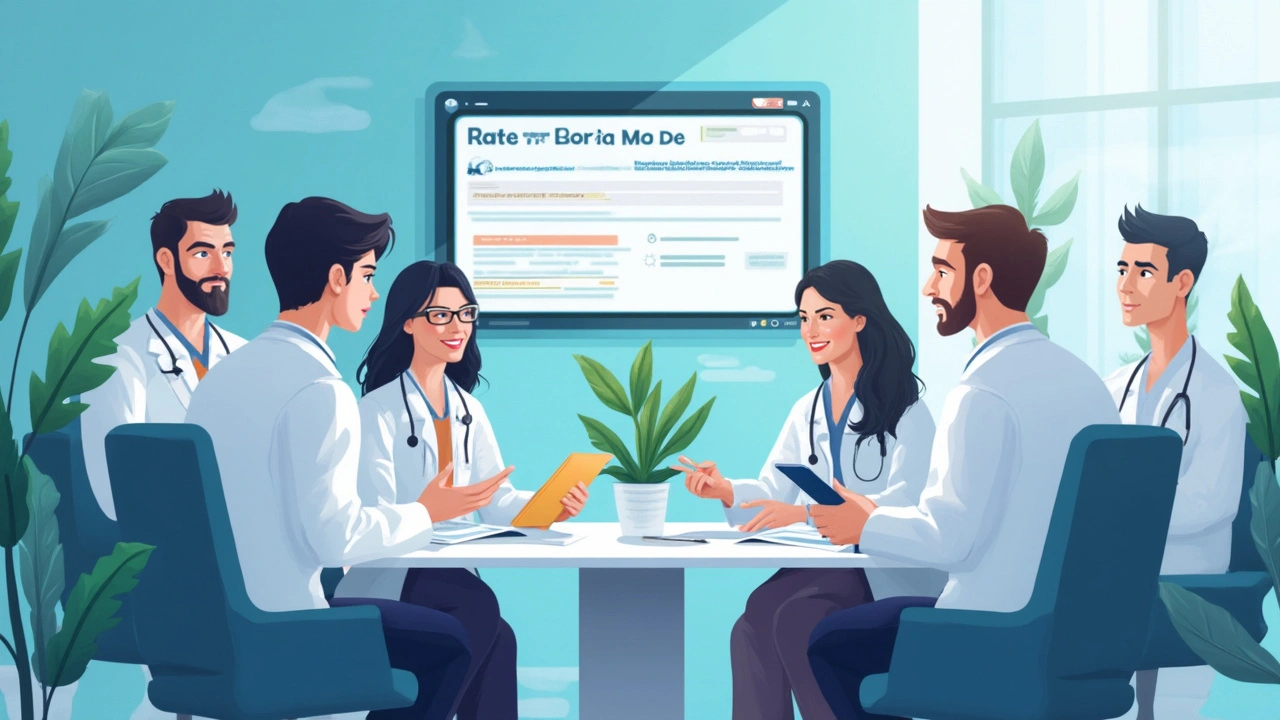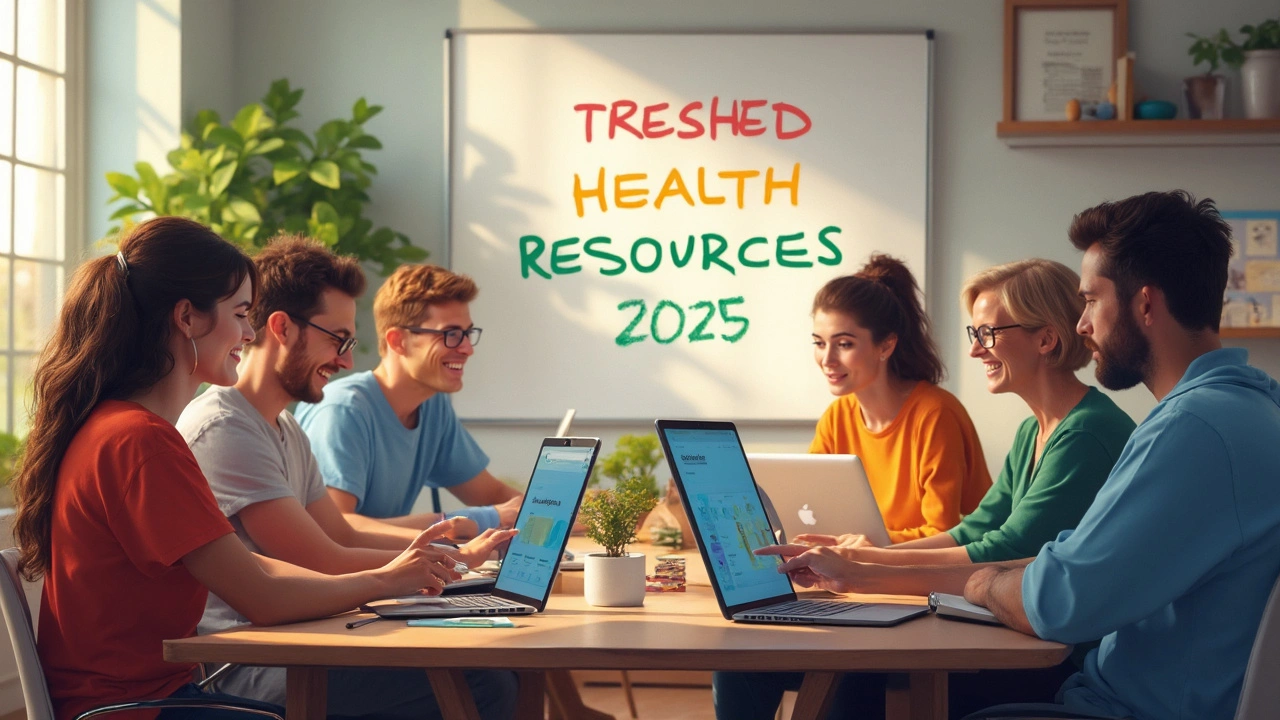You search for a rash or headache, end up convinced you have a rare tropical fever, and realize three hours later you’ve fallen deep into the WebMD hole. Sound familiar? In 2025, WebMD’s reputation for clickbait-y suggestions and generic lists doesn’t exactly inspire confidence. With medical advice more accessible and personalized than ever, people expect more than recycled articles and pop-up ads. But what sites actually do better?
The Problems With WebMD (And Why You Need Better)
Let’s face it: WebMD can sometimes feel more like a panic generator than a helpful guide. Sure, it’s popular—back in 2023, it held over 70 million unique monthly visitors. But with more users came more ads, outdated info, and content that’s written for everyone but personal to no one. The “list of possible conditions” can make the healthiest person anxious. Even more worrying, not every article lists who reviewed it or what qualifications they have. That’s a huge red flag.
Ask any medical professional in Portland—or anywhere, really—where they get answers. Hint: It’s not WebMD. Healthcare providers gravitate toward sites that cite real studies, share sources, and put MDs and PhDs front and center. If a platform isn’t transparent about who’s reviewing its content or what studies back up the claims, you’re basically guessing. And why should you guess about your health?
There’s a growing demand for platforms that do these three things: explain medical facts in plain English, prove the info comes from reliable sources, and have board-certified experts reviewing everything. Trust is non-negotiable. People don’t want generic; they want specific answers for real concerns, not worst-case scenarios. That’s the new gold standard in health info.
In 2025, you have better options. The question isn’t “Is there an alternative to WebMD?” but “Which evidence-based site should I trust?” Before digging into the best of the best, check out this quick table that breaks down the main frustrations with WebMD and what new platforms are getting right:
| WebMD Limitation | Better Alternative Features |
|---|---|
| Ads and sponsored content everywhere | Minimal ads, funded by medical schools or non-profits |
| Vague, list-based diagnoses | Personalized advice, clear next steps |
| Reviewer credentials often hidden | Every article openly reviewed by board-certified experts |
| Outdated or recycled info | Content updated quarterly, direct links to new studies |
| Hard to understand medical jargon | Plain English, real-life examples, explainers for each term |
So, why keep settling for anxiety-inducing symptom checklists? There’s a healthier way forward.
What Makes a Health Site Truly Trustworthy?
If you’re looking to avoid another night of doom-scrolling, it helps to know what separates a reliable medical website from a rumor mill. The big difference comes down to evidence-based content and expert review, not flashy design or celebrity spokespeople. Reliable sites clearly state where their info comes from—and those sources aren’t random blogs or Wikipedia pages.
Here’s what you should look for:
- Board-certified experts review every major article. If you don’t see credentials, that’s your first warning sign.
- References to peer-reviewed medical journals. Example? If you read about migraine treatments, you should see links to studies published within the last two years, not just a summary of older guidelines.
- Information gets regular updates. Medicine changes fast. If a site hasn’t updated its diabetes guidelines since 2022, how can you trust anything newer?
- Easy-to-understand language. No one should need a dictionary to figure out if their cough is serious. Top health sites explain terms, offer relatable scenarios, and give practical tips.
- Transparency about sponsorships or ads. The best sites are usually funded by medical schools, respected organizations, or public grants—not pharma ads targeting your panic.
A lot of people still ask: what site is better than WebMD for accurate, up-to-date health info? The answer: sites that care about facts over clicks. Some even show you the reviewer’s photo and bio at the top of every article. That’s real transparency.
Want a pro tip? Don’t just check who wrote an article—check if they’re still seeing patients or teaching at a medical school. Active, practicing experts spot outdated protocols a mile away and won’t let bad info slip through.
If you see independent fact-checking, that’s another win. No one gets everything right the first time. But sites that openly correct and update their articles after review clearly take accuracy seriously. That’s the kind of attention to detail your health deserves.

Top Health Sites Outperforming WebMD in 2025
So which sites tick every box? In 2025, there’s a new set of stars, and chances are you haven’t heard about all of them—yet. Here’s where physicians, nurse practitioners, and evidence geeks go when they want cutting-edge, unbiased advice.
- Mayo Clinic Online: The gold standard. Every article gets reviewed by either a Mayo Clinic physician or a tightly vetted medical writer. Content gets updated three times a year—some pages even monthly. Recent stat: 96% of users rated info clarity as “Very good” in a 2025 internal survey. You get details on rare diseases without the scare tactics.
- Cleveland Clinic Health Essentials: This one’s more practical than textbook. They focus on everyday wellness and chronic conditions, with a heavy emphasis on prevention. Every article lists author credentials clearly. No guessing who wrote what or what part was reviewed.
- MedlinePlus (from the U.S. National Library of Medicine): Think of this as the Wikipedia of medical facts—except with government funding and strict vetting. All info references studies or guidelines, not opinions. They’re also 100% ad-free.
- Healthline: Once dismissed as “just another blog,” by 2025, Healthline has rebuilt its credibility by recruiting board-certified reviewers for every major health category. Users appreciate their “plain talk” symptom guides.
- BMJ Best Practice: This is where medical students and doctors go for concise, evidence-backed treatment steps. While some content requires a subscription, the free sections remain unbeatable for second opinions—or if you just want to double-check what your doctor said.
- Johns Hopkins Medicine Health Library: Clear, up-to-date, no fluff. You also get unique “Ask an Expert” articles covering trending conditions and controversies.
Check out how these stack up in a side-by-side data table:
| Site Name | Board-Certified Reviewers | Last Update Frequency | Ad-Free Experience | Plain English Explanations |
|---|---|---|---|---|
| Mayo Clinic Online | Yes | 3x/year | Mostly | Yes |
| Cleveland Clinic Health Essentials | Yes | 2x/year | Yes | Yes |
| MedlinePlus | Yes | Quarterly | Yes | Yes |
| Healthline | Yes | Quarterly | Some ads | Yes |
| BMJ Best Practice | Yes | Monthly | Yes (free section) | Yes |
| Johns Hopkins Health Library | Yes | 2x/year | Yes | Yes |
The key: every site in this list has a team of medical pros looking out for accuracy. These aren’t just “about us” claims—start clicking around, and you’ll spot the real expertise quickly.
Tips for Spotting Evidence-Based Medical Content
Let’s get honest—anyone can make a site look legit. A few pretty graphics, some supposed “doctor” names, and suddenly you’re trusting info that’s outdated or just plain wrong. So how do you protect yourself (and your friends or family) from bogus health advice?
- Google the reviewer’s credentials: Are they listed as “MD” or “DO”? Look up their license on state boards. If the names are just “staff writer” or “health team,” that’s a red flag.
- Check reference links: Reliable health sites always back up big claims. If a site brags about a “breakthrough” but points only to itself, you’re not really seeing evidence.
- Spot correction policies: Teenagers and medical experts both make mistakes. What matters is whether the site corrects and updates its articles when new studies come out. Honest correction notes mean they care more about facts than appearances.
- Investigate funding sources: Scroll to the bottom—who sponsors the content? If you see a shady supplement company, be skeptical. If a university or major hospital foots the bill, that’s a plus.
- Use readability tools: If you can’t explain an article to your grandma, the site could be over-complicating things just to look smart. The best info is clear, not condescending.
And don’t be shy—if something feels off, ask your provider where they would read about the same topic. You’d be surprised how many doctors and nurses recommend the sites above to their own family members.

The Future of Health Info: Smarter, Safer, and More Personal
Medical websites in 2025 aren’t just newsletters copy-pasted from dated medical journals. The best are moving toward dynamic, responsive advice. Some now use AI (supervised by humans, of course) to help you find not just “what could this be?” but also “what can I try myself before seeing a doctor?” and “what’s the latest research on this topic?” That’s a massive leap forward from the anxiety loops WebMD often triggered.
Sites are also rolling out localized content. If you’re in Portland like me, you can finally read about allergy triggers tied to your city, not just somewhere across the country. Some even bring in current air quality, pollen counts, or pandemic flu data for your ZIP code. That’s personalized information prior generations only dreamed of.
Another emerging trend: real-time expert chats. Several Mayo and Cleveland Clinic toolkits now let you submit questions that get answered by board-certified pros within hours, not days or weeks. You avoid the social media rumor mill and get empathetic, evidence-based answers without that “wait, is this real?” feeling.
And, these new platforms? They not only teach; they empower. More patient stories, actionable tips (not just “see your doctor!”), and even videos from practicing docs—because sometimes you just need to hear a calm voice explain things, not read another wall of text.
But don’t just take my word for it. Try a few yourself, bookmark those that put your mind at ease, and keep circling back to check for new updates. You won’t find one perfect site for everything, but you will find tools that respect your intelligence and your time much more than the old anxiety factories ever did. It’s your health—demand better information in 2025 and beyond.


Mangal DUTT Sharma
July 17, 2025 AT 22:40Wow, this is just what we need in 2025! Sometimes I feel like WebMD just skirts around the edges of the problem without really diving deep enough, plus those ads make it so hard to focus.
I appreciate that this guide highlights sites vetted by board-certified experts rather than just random contributors or crowd-sourced content.
Have any of you noticed a big difference in how these newer sites handle emerging research compared to the old guard like WebMD?
Because from my experience, sticking with sites that are transparent about their medical backgrounds really saves us from misinformation.
It'd be great if the post could include which health topics get the clearest treatment on these new platforms.
I'm super curious if mental health advice is also better covered now because that's often a struggle to find reputable sources for, you know? 😊
Looking forward to trying some of these recommended sites and exchanging thoughts!
Gracee Taylor
July 18, 2025 AT 08:00I totally agree with you! It’s refreshing to see a push for evidence-based health sites that are actually transparent about their medical sources.
Honestly, WebMD feels a bit generic nowadays, and their advice can sometimes feel outdated or too cautious.
These new sites seem to prioritize clarity and precision which is so needed when we’re searching for health answers.
Also, the absence of invasive ads would make for a much less stressful experience.
Does anyone here have recommendations of sites they've personally used that stood out in terms of trustworthy info?
Would love to start building a go-to list beyond just WebMD. The bit about where medical pros look for answers resonates a lot!
Alex Jhonson
July 18, 2025 AT 17:20Been hunting for legit health info for a while now and it’s honestly exhausting with all the noise out there. This guide seems like a gem, thanks for sharing.
What I like is that it’s curated by experts, not just some algorithm pumping out articles for clicks.
I’m curious if they cover alternative medicine too? Since some folks swear by it, even if it’s controversial.
And I imagine the transparency angle means you can check references pretty easily on these sites?
Having clear citations is a huge plus because it builds trust, ya know.
Would be awesome if we also got a feature comparison between these sites and WebMD so people know what to expect.
Michael Weber
July 19, 2025 AT 02:40Look, anyone serious about health info knows WebMD has become a joke — flood of ads, surface level blurbs, and a ton of sensationalism!
This post is a relief because it points out the real evidence-based platforms that actually value medical credibility instead of clickbait.
It's funny how many people still trust the old guard blindly without questioning their sources or bias.
Ask yourself – why isn’t WebMD calling doctors themselves to vet this info anymore?
This new wave of health sites restoring transparency is about damn time.
We deserve facts, not fluff.
And transparency about medical backgrounds is what separates the wheat from the chaff.
Blake Marshall
July 19, 2025 AT 12:00Honestly, from what I’ve seen, most people don’t even realize how sketchy some health sites can be.
This guide makes it super clear which ones are the real deal, and which are just noise masquerading as info.
WebMD might still be popular but it’s def not the gold standard anymore, not with those endless ads and generalized advice.
I’m all for sites that let you dig deep and actually understand the science behind health recommendations.
Does anyone know if these alternative sites keep their info updated frequently? Because a lot can change in medicine fast.
It also helps if they’re user-friendly and don’t make you feel like you’re reading a textbook.
Jillian Bell
July 19, 2025 AT 21:20Let’s not be naive here, many of these health sites, even if they claim to be 'evidence-based,' have hidden agendas or ties to pharma companies.
Anyone who thinks transparency is truly possible in this space is deluding themselves.
Even trusted-looking sites can subtly steer you toward treatments or drugs that serve corporate interests.
I’d want to see a full disclosure list, like who funds these sites, before buying into their 'medical experts' validation.
This post sounds promising but I’m naturally suspicious, especially with how the internet is loaded with half-truths dressed as facts.
We need to be vigilant and critical, questioning everything, not just switch to a new branded source.
Shana Shapiro '19
July 20, 2025 AT 06:40@472 You raise a valid point about corporate bias. It's so important we scrutinize these info sources thoroughly.
But I think this guide's focus on transparency and board-certified review might help sort the good from the shady.
Honestly, we’ve all faced the confusion and contradictions of health advice online, and it’s emotionally taxing.
Having places grounded firmly in science and clear about their backgrounds provides some comfort and trust.
Of course, healthy skepticism is essential, but total paranoia can hinder us from getting real help.
I’d be interested in discussions about how these sites handle conflicting studies or evolving guidelines, too.
It's a complex but necessary conversation for sure.
Jennifer Brenko
July 20, 2025 AT 16:00The Canadian health info landscape has been pretty solid, but even we rely on international evidence-based sites.
This list seems like a decent step towards cutting through the clutter.
WebMD’s shortcomings are glaring, and it’s good to see alternatives getting spotlighted.
It’s essential we support platforms that prioritize research rigor over views or profit.
That said, users still need to approach any medical advice online with critical thinking and consult professionals when needed.
But yeah, a clean, ad-light interface with expert verification is a huge plus for public health literacy.
Hope the guide also touches on pediatric and geriatric care info availability on these sites.
Christopher Stanford
July 21, 2025 AT 01:20Look, I’m skeptical about how 'expert-reviewed' these sites really are. Some reviewers might just be glorified content editors.
And let’s not forget, WebMD had its flaws but it also brought widespread accessibility.
This new wave of sites needs to prove they aren’t just gating info behind complex jargon or paywalls.
Otherwise, how much better can they really be?
I’d like to see actual user testimonials with examples of improved health literacy or outcomes.
Otherwise, it’s just marketing spin waving the 'evidence-based' flag.
Still, I’m hopeful this guide points us in the right direction.
Alex Jhonson
July 21, 2025 AT 10:40@464 That’s a fair critique. Accessibility is key if we want to empower people to make their own health decisions.
Maybe the best approach is a combination of clean design, expert validation, and understandable language.
And a community or forum where users can share experiences safely might help too.
I think any credible site has to listen to its audience and adapt over time.
Does anyone know if these recommended sites have such feedback loops or user engagement?
Feedback and transparency should go hand in hand.
Sunil Kamle
July 21, 2025 AT 20:00Allow me to elevate the discussion here with a dose of well-articulated, highly formal perspective.
The quest for truly evidence-based health information platforms must be approached with a discerning eye, beyond mere slogans and marketing rhetoric.
While the post rightly condemns the commercialized excesses of platforms like WebMD, we should recognize that no single resource can serve all nuances of medical inquiry flawlessly.
Nonetheless, the departure from uncritically accepted health aggregators toward sites emphasizing expert review and transparency ought to be commended.
One must remain vigilant regarding the dynamism of medical knowledge and the imperative for continual updates in digital resources.
Hence, practitioners and laypersons alike should cultivate a habit of consulting diversified, reputable sources.
What I posit is that such guides become essential educational tools to refine our collective health literacy.